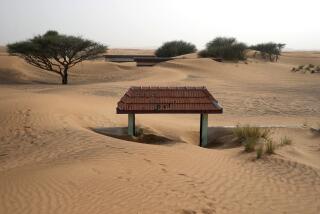Zayed Al Nahyan, 86; Sheik Was United Arab Emirates’ Leader
- Share via
DUBAI, United Arab Emirates — Sheik Zayed bin Sultan Al Nahyan, who as president of the United Arab Emirates oversaw the transformation of a cluster of tiny desert Persian Gulf sheikdoms into a leading oil and business hub, has died. He was 86.
Abu Dhabi TV interrupted regular broadcasting Tuesday to break the news of the death of the man who led the United Arab Emirates since its independence from Britain in 1971. He had been in failing health for several years, was largely out of the public eye and did not attend Arab summits. He had a kidney transplant in August 2000.
Sheik Zayed was expected to be succeeded by his eldest son, Sheik Khalifa bin Zayed Al Nahyan. The leaders of the seven emirates that make up the country will appoint the new president within 30 days.
In the meantime, the prime minister -- Sheik Maktoum bin Rashid Al Maktoum, a close relative of Sheik Zayed -- will serve as acting president. During the president’s illness, Sheik Maktoum has been the public face of the United Arab Emirates.
One of the richest rulers in the world, according to Forbes magazine, Sheik Zayed forged close ties with the West during his rule of the country, which is the world’s ninth-largest oil producer and the fifth-largest exporter.
After the Sept. 11 attacks on the United States, the United Arab Emirates was among several Arab countries pressured by Washington to reform their financial sectors, which had been linked to funneling funds to terrorist groups such as Al Qaeda.
Sheik Zayed led the unification of the seven tiny emirates on the eastern edge of the Arabian Peninsula. He became the ruler of Abu Dhabi, the largest emirate, in 1966, four years after the emirate began exporting the offshore oil it had discovered. At the time, the city of Abu Dhabi was a collection of huts clustered around the ruler’s fort.
Billions of oil dollars were invested to make Abu Dhabi an oasis of high-rises, parks and a wildlife island. The country, with a population of about 850,000 Emiratis and 2.6 million foreign expatriates, has also sought to diversity its economy, becoming a center for banking and finance. Dubai, the second-largest emirate, now gets most of its revenues from trade.
Sheik Zayed’s family held more than three-quarters of the stock in the Bank of Credit and Commerce International, which in the early 1990s was at the center of one of the world’s biggest bank frauds. Severe losses in securities trading and phony loans and insider stock trades led to the collapse of the bank, which had offices in 69 nations. Twelve top executives from the bank were convicted and forced to pay about $9.13 billion in restitution to the Abu Dhabi government.
Sheik Zayed was married many times, though he adhered to Islamic law limiting a man to four wives at any one time. He had more than 21 sons and a number of daughters.
He is expected to be buried today.










